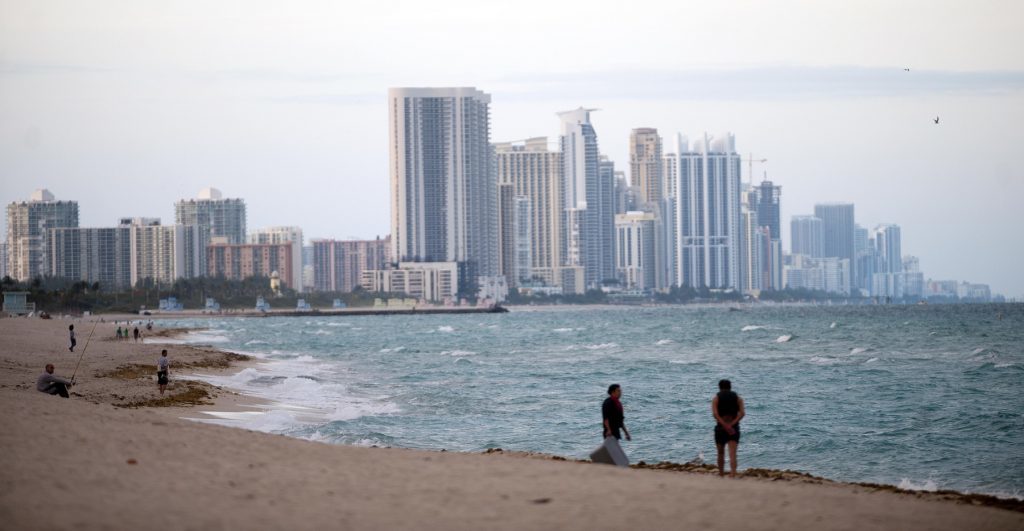
Hurricane Irma has left death and destruction in its wake with one British territory being “pummelled” overnight and another declaring a state of emergency.
Medical supplies and other aid were due to be flown to the worst affected areas on Friday following a pledge from the British Government of £32 million towards the relief effort.
The Turks and Caicos Islands government declared a national shutdown as the category five storm continued to tear across the Caribbean, with life-threatening wind, rain and a storm surge expected into Saturday.
The British Virgin Islands, which saw houses reduced to their foundations and many roads impassable following the “devastating” storm, has declared a state of emergency.
Images posted on social media showed entire structures razed to the ground, with debris scattered across the streets.
A spokesman for the Ministry of Defence said aircraft carrying around 100 personnel, made up of engineers, marines and medical specialists, will take rations and medical supplies to the area.
It has been difficult to gauge the full effect of the storm due to communication lines coming down but the
Department for International Development, which is co-ordinating aid, has sent advisers to Antigua, Barbados and Jamaica to assess damage.
A spokeswoman for the department said people are being evacuated from Barbuda to Antigua in advance of Hurricane Jose hitting in the coming days.
Two British women thought to be missing on Barbuda following the hurricane have been spotted helping with the relief efforts, a relative told Good Morning Britain.
Afiya Frank, 27, who is six months pregnant, and her sister, Asha Frank, 29, had not been heard from since Tuesday but have now been seen on the island, a cousin said.
On Thursday night, the governor of the British Virgin Islands, Gus Jaspert, said they were doing all they could “with the limited resources we have available”.
In an audio recording, he said: “I come to you with a heavy heart after experiencing and observing the extent of devastation caused by Hurricane Irma.
“After consultation with the premier, I have declared a state of emergency for the territory.”
There has been criticism of the Government’s response to what is the most powerful hurricane ever to hit the
Atlantic, with some saying more should have been done to prepare for the devastation.
Addressing concerns about the speed of Britain’s response, Prime Minister Theresa May said both humanitarian workers and RFA Mounts Bay had been “pre-positioned”.
Defence Secretary Sir Michael Fallon added that the military vessel is “already at work” clearing roads and helping to restore power.
The hurricane’s ruinous touch, which has already reduced the island of Barbuda to wreckage, will also be felt in nearby Haiti as the storm sweeps north-west.
Irma was first classified as a tropical storm on August 30 and rapidly intensified over the following days, becoming a category four hurricane on September 4.
Then winds reached a peak of 130mph but soon became the strongest for more than a decade when sustained winds peaked at 185mph.
Saint Martin, which has already fallen victim to Irma, is also facing a new threat in the form of Jose, while the British territories of Anguilla and Montserrat are on alert for a tropical storm.
Thousands of British tourists believed to be in the Caribbean have been warned to follow evacuation orders while some have been advised to stay in their hotel rooms.
Holiday firms said they are monitoring the situation and some have cancelled flights or offered to amend bookings for those due to travel to affected areas in the coming days.
States of emergency have been declared in Puerto Rico, Cuba and Florida, where the storm is due to make landfall this weekend.
In Fort Lauderdale, 40-year-old Erik Petersen described the atmosphere as “pretty tense” – adding that there was much more worry than last year, when the Sunshine State braced for Hurricane Matthew.
The dual American-British citizen told the Press Association: “People aren’t just talking about this as a hurricane, they’re talking about it as the hurricane.
“I’ve had a few people ask if I’m considering going somewhere else in Florida, but this thing’s the size of Texas. Roads are clogged, hotels are full, gas is running low.
“I’d rather face this thing in a house in Fort Lauderdale than in a car in a traffic jam somewhere outside Orlando.”
Mr Petersen, who lived in the UK for 11 years and most recently called Nottingham his home city, is riding out the storm with his 36-year-old wife, Jo, and their six-year-old daughter, Anya.
He said he was expecting lots of damage and said power could be out for weeks.
“With no electricity or air conditioning, you get used to stinking. Some people have generators. Unfortunately, we don’t,” he said.
“Luckily we do have a gas oven, so we can cook without electricity.
“Anya largely sees this as a big camp-out or adventure, which I suppose is good.
“Jo hasn’t been through a hurricane before, but she’s been through hurricane prep, so she’s in full-on Spirit of Dunkirk/Getting Stuff Done mode.
“My parents have lived here for many years and seen a lot of stuff. They’re not panicking, but they’re taking this all very seriously.”
Recommended for you
